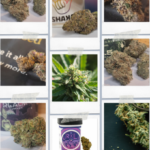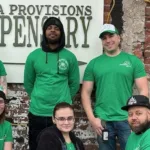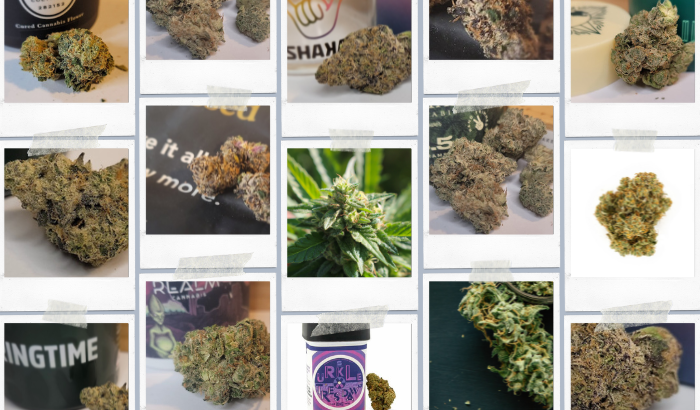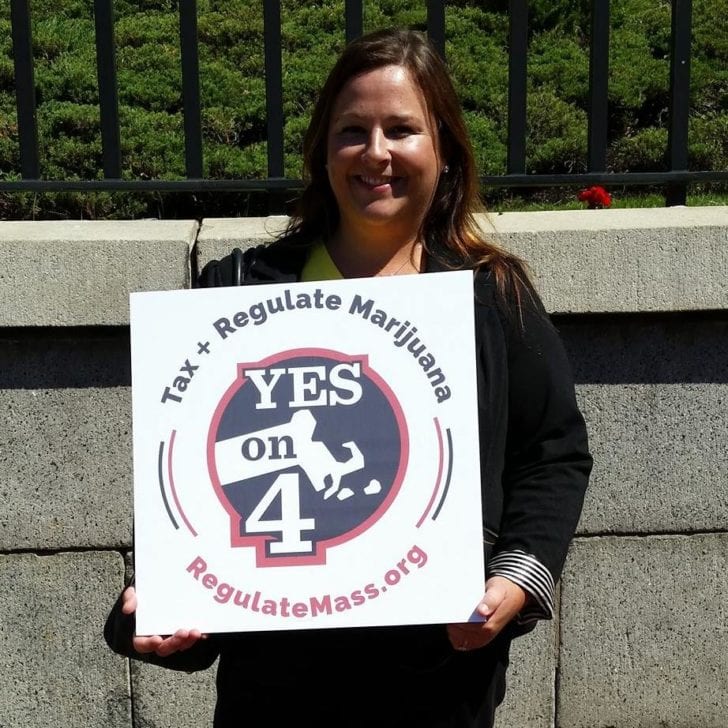
Beth Waterfall says she was raised to climb the corporate ladder, and to “earn lots of money” without “ruffling any feathers along the way.” By 2015, she “was deep into a career in professional services marketing,” but with salary and title bumps, before long she found herself “doing less and less of the creative marketing work” that she had enjoyed early on. “My daily existence,” she realized, “was mostly about placating egos, balancing budgets, and for the most part helping wealthy white men help other wealthy white men get richer.”
To make matters worse, Waterfall “was taking up to six Xanax per workday.” She “needed to quit and be open to new possibilities,” and “had been doing some nonprofit consulting on the side,” so when she quit her full-time six-figure-salary gig, Waterfall was motivated to look elsewhere for a new career.
“Soon after my departure from ‘normal’ career life,” she says, “I read an article about the medical marijuana program in Massachusetts.” The article made her realize two things: first, that she could get a medical marijuana card, and second, “that there was this new industry bubbling up to support [the cannabis] industry.” Despite having been a consumer for 20 years, it was the first time she recalls seeing “an opportunity to make a career combining two things [she] loved: cannabis and creative marketing.”
We asked Waterfall, who went from attending the New England Cannabis Convention in 2015 to helping organize this year’s upcoming NECANN on March 24 and 25 at the Hynes Convention Center, about her big switch, her ELEVATE New England organization, and how she’s found her footing in the industry.
How did you make the transition and begin working in the cannabis business? What has surprised you most?
In my previous career I’d helped attorneys and other executives build their professional presence, become thought leaders, and find new clients. It was precisely what I needed to do for myself as a “newbie” in the cannabis industry, so I took my own advice and made networking and writing my priorities. I also identified some people and companies that I thought I may like to work for someday, and offered to do some projects for free.
What surprised me most during my transition was just how little I knew about this plant that had been a part of my life for more than 20 years. I wasn’t an expert … but my mind was absolutely blown when I started learning both at NECANN and in the classes that I signed up for immediately thereafter. I was humbled and a fire was ignited inside me to keep on learning and connecting—and to advocate for the plant and people using it and working with it. This kind of motivation and personal satisfaction gained from doing something to help change the world for the better was something I’d never experienced. I never thought my voice really mattered. But it did. It does. So that, too, was as wonderful surprise!
You were involved in many of the campaigns that made cannabis legalization possible here in Massachusetts. What was that experience like?
Prior to “finding” the cannabis industry in 2015 I had certainly voted for our medical marijuana program and for decriminalization, but it had never occurred to me to get involved in any political campaigns. What would my voice do? How would I find the time? What was actually all that important to me? I didn’t know. And I feel like now I’m making up for decades of lost time that I could have been involved in more activism for causes that are important to me.
I supported the Yes on 4 Campaign by including their spokespeople at the networking events I was hosting, encouraging others to support the campaign, and for the first time in my life I participated in canvassing. I even stood outside South Station after work with my Yes on 4 sign—I never thought I’d do something like that. Working with the campaign team, I also started Massachusetts Mothers for Taxation and Regulation of Marijuana, which drew renowned travel expert and cannabis philanthropist Rick Steves to speak at one of our events. Getting involved in the Yes on 4 campaign was invigorating, motivating, and just an all-around fulfilling experience. And we won!
Cannabis changed my life not only because of my career but also because it made me realize I do have a voice, and I can engage and motivate others to speak up, too.
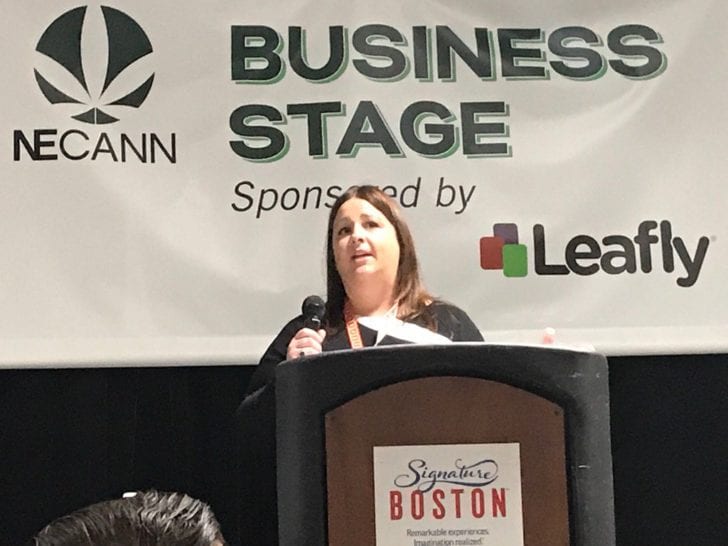
You recently founded ELEVATE New England. What is this organization and why is it important to our community.
It was hard to ignore the fact that there was a deficit in available quality cannabis education in a comfortable and professional setting—nevermind the glaring lack of public education happening to let people outside the cannabis industry understand the history of the plant, prohibition, motivations and repercussions of the War on Drugs, safe access and dosing, what’s legal, etc. And it seems that each cannabis industry event that I attended or hosted involved at least one person saying how “education is the most important thing” that the industry needs. With ELEVATE, my co-founders, board, and I developed a platform for cannabis and non-cannabis businesses to provide education within and outside the industry by barely lifting a finger. We’re a public benefit corporation providing the public relations and public education that the industry needs.
Because our businesses cannot succeed without multiple perspectives, an educated community, and an informed customer base, ELEVATE New England’s mission is to empower underrepresented populations in the cannabis industry, and to empower our communities to be educated customers and responsible consumers.
The concept of businesses and industry professionals coming together to support education and inclusion is certainly resonating with the local cannabis community, and I’m proud that ELEVATE can be the vehicle for that. Our team also recognized how important it was to our community to be a nonprofit organization that is transparent, accountable, and effective, and we are in the process of applying to become a registered 501(c)(3) nonprofit organization so that donations made to ELEVATE NE can be tax deductible. It’s a circle of collaboration for the good of the cannabis industry.
What advice do you have for the Cannabis Control Commission?
Don’t forget to sleep is my best advice! What they’re doing is really incredible and I’m sure exhausting. But at the end of the day our commissioners are human beings trying to do right for other human beings. And they need our collaboration and support. I delivered spoken and written testimony to the CCC with recommendations to include and protect workers, including specific recommendations relating to sexual harassment policies and penalties, and creating education and opportunities for women, LGBTQA+, veterans, people of color, people with disabilities, the elderly and other groups who are marginalized in established industries to not only work in the Massachusetts cannabis industry but to be business owners and leaders, too.
Also, since cannabis education changed my life, I made recommendations around vocational and public education to ensure that qualified educators are delivering accurate and helpful information. And because I’m an event planner who loves our Commonwealth, I recommended the inclusion of single- and multi-day public consumption event licenses and encouraged a diverse pipeline of cannabis products and access points to support tourism demands.
What three benefits of legalization are you most excited about for the future?
I believe that cannabis is changing the world for the better. There are countless benefits of legalization but the three most important to me and the work I’m trying to do with ELEVATE New England and my clients are:
- Careers and financial independence: The cannabis industry presents an exciting opportunity for experienced professionals with expertise from working in other industries to transfer their knowledge and be a part of the shaping of the foundation of that new industry. I now know what it means when people say “it isn’t work when you love what you do.”
- A kinder, gentler (and safer) society: Legalization means the breaking down of the stigma against cannabis patients and other adult users. While it will be a long time before cannabis is as socially accepted as alcohol, I believe it will happen as more education and product options become accessible to more people. And, when it’s acceptable, convenient and legal for adults to share a joint with friends instead of case of beer, we will see less alcohol-induced rage, violence, accidents—and regrets.
- Innovation: From Hempcrete to vape pens and cannabis sequencing, the legalization of cannabis is bringing to our eyes and ears the thrill of experiencing incredible innovations for both medical marijuana patients and adult users. We are witnessing and actively participating in a historical paradigm shift, and I can’t imagine anything else being more exciting. When I’m feeling discouraged or overwhelmed, I remind myself, “Holy crap, I get to do this.”
Ed. note: DigBoston’s previous owner is an owner of NECANN, and Dig Editor-in-Chief Chris Faraone sits on the NECANN board.




